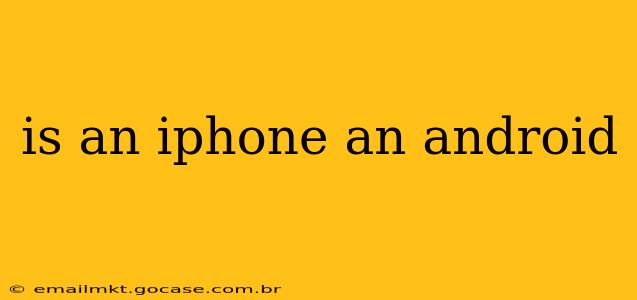No, an iPhone is not an Android. This is a fundamental difference in the mobile phone market, and understanding the distinction is crucial for anyone considering a new phone. The confusion often stems from both being smartphones, but they operate on entirely different operating systems and are produced by distinct companies. Let's delve into the key differences.
What is an Android?
Android is an open-source mobile operating system (OS) developed by Google. This means the source code is publicly available, allowing various manufacturers like Samsung, Google (Pixel phones), OnePlus, and many others to customize and build their own versions of Android. This leads to a wide variety of Android phones, each with its own unique features and designs. Because it's open-source, developers have extensive freedom to create apps and integrate services.
What is an iPhone?
An iPhone is a smartphone manufactured by Apple. It runs on iOS, a closed-source operating system developed exclusively by Apple. Unlike Android, iOS is not available for other manufacturers to use. This means all iPhones operate on the same core iOS system, although there are updates and versions released over time. Apple controls the entire ecosystem, from the hardware to the software and the App Store.
What's the Biggest Difference? The Operating System
The core difference between an iPhone and an Android phone lies in their operating systems. Think of the OS as the brains of the phone; it dictates how the phone functions, looks, and interacts with apps. iOS and Android are distinct, with different interfaces, app ecosystems, and functionalities.
What are the key differences in the user experience?
-
Interface: iOS is known for its simplicity and ease of use, with a clean and intuitive interface. Android offers more customization options, allowing users to personalize their home screens, widgets, and settings.
-
App Ecosystem: Both platforms have vast app stores, but the apps themselves can vary slightly. While many popular apps are available on both, some apps might offer unique features or be exclusive to one platform.
-
Hardware: iPhones are made solely by Apple, meaning a higher degree of integration between hardware and software. Android phones are manufactured by various companies, resulting in a wider range of hardware options, prices, and features.
Do iPhones and Android phones have similar features?
While their operating systems differ, modern iPhones and Android phones share many features:
- Camera Capabilities: Both offer high-quality cameras with advanced features.
- Connectivity: Both offer 4G LTE and 5G connectivity options.
- App Functionality: Most everyday apps are available on both platforms.
- Processing Power: Both offer powerful processors for smooth performance.
How do I choose between an iPhone and an Android phone?
The choice depends entirely on your personal preferences and needs. Consider these points:
- Budget: Android phones offer a broader price range, catering to various budgets.
- Operating System Preference: Do you prefer a simple, user-friendly interface (iOS) or a highly customizable one (Android)?
- Ecosystem: Are you already invested in the Apple ecosystem (iCloud, other Apple devices)?
- Specific Features: Do you need certain features that are exclusive to one platform?
In conclusion, an iPhone is distinctly different from an Android phone. The choice between the two is a matter of personal preference, but understanding their core differences in operating systems and overall user experience is essential for making an informed decision.
